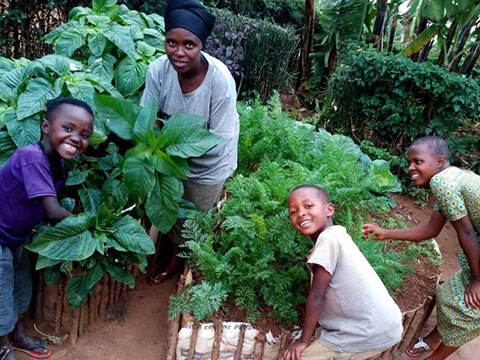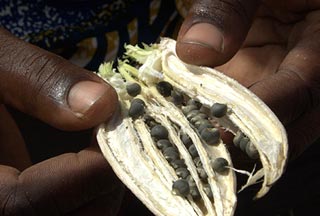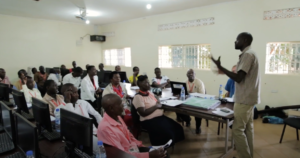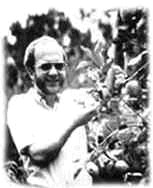Simple Solution, Life-Changing Result
While Thailand is a peaceful country, neighboring regions have been

Help families move from barely surviving to thriving when you join the special ECHO Thrive Team. Your monthly gift ensures life-changing trainings and resources are available. For as little as $10 a month, you can make a lasting difference. Monthly giving is a convenient way to give and show you care – with powerful results.

ECHO’s Online Gift Catalog gives you the opportunity to donate in honor of a loved one. Your hard-earned money will reduce hunger and improve lives worldwide and your recipient will have the heartwarming feeling of knowing that a gift was made in their name!
While Thailand is a peaceful country, neighboring regions have been

When agricultural lands are depleted or overgrazed, incomes dwindle and
In the early 1970’s Indiana businessman Richard Dugger led a group of high school students on a visit to Haiti and was deeply moved by the plight of people that he met. His eyes were opened to the level of poverty that existed and still exists in our world today. He and others made personal commitments to share their time and resources, they prayed and dreamed of ways to help meet the needs that they had seen. Other Christian laymen and clergy from Indiana and Florida caught the dream, and ECHO (Educational Concerns for Haiti Organization) was born. Until 1981, ECHO worked on various projects in Haiti.
"That experience was so deep for dad. He wanted to start something. As a board member, I hope to continue telling ECHO’s story. I want to be a part of something that’s bigger than just me.”
Greg Dugger, Current Board Member, son of Founder Richard Dugger Tweet

ECHO’s role in international agricultural development was more clearly defined with the arrival of Former Executive Director, Dr. Martin Price, in June of 1981. The work in Haiti was closed, and all of ECHO’s resources were directed towards strengthening the work of other organizations. Under his direction ECHO has become an ever growing pipeline for sharing information, ideas, techniques, methods, plants, books, materials, solutions … whatever has potential to ease world hunger. ECHO’s primary functions are providing agricultural information to overseas workers, distributing seeds for promising food plants, and offering training opportunities at the Florida farm. ECHO’s role and purpose as conceived in the early 1980’s endures today, and as a result, ECHO’s “history” is mostly a story of the expanding ministry.
The first issue of ECHO’s highly regarded ECHO Development Notes (EDN) was published in 1982 and mailed to 36 interested individuals.
During 1987 the office activities moved from a room in the lower level of the A-frame dormitory to a large rented office trailer, but by 1991 the “spacious” office trailer was badly crowded. ECHO purchased a 7 1/2 acre adjoining farm to provide housing and expansion space and the A-frame was remodeled to provide additional office space.
"I'm glad we are able to do more to help the world by pulling together."
Tom Carpenter, Board Member Emeritus Tweet
"We can't think about what has happened at ECHO without thinking of the verse, 'God is able to do far more abundantly that you ask or think.'"
Dr. Martin Price, Founding CEO Tweet
In 2001, ECHO received a grant to develop the Global Farm and Research Center in which six separate areas of tropical climates are simulated. Each of the six agricultural interns takes care of his or her own climate zone. Currently featured on the farm are the tropical lowlands, tropical highlands, monsoon, semi-arid, rainforest clearing, community garden, appropriate technology and urban garden. The global farm is not only a hands on training ground for those searching for help in tropical agriculture, but also an educational tool to make the public aware of hunger related issues and the answers there are to alleviate malnutrition and starvation.
In 2009, ECHO Opened the first Regional Impact Center in Chiang Mai, Thailand. Drawing from strong leadership in the region, this pioneer effort led the way for future impact centers around the world.
"No one can read the New Testament and not understand that involvement with individual people is a very important part of God's will for our lives. Once I began following Christ I began to care about people and to seek ways to minister to them."
Dr. Martin Price, Founding CEO Tweet
In 2011, ECHO launched ECHOcommunity.org, the online collaborative membership community of ECHO. ECHOcommunity.org connects over 16,000 small-scale farmers, and those working to eliminate world hunger, with essential resources, and each other. These resources include a vast knowledge base of practical information, experienced technical support and an extensive seed bank focused on highly beneficial underutilized plants. In 2017, a forum called “Conversations” was added to ECHOcommunity.org to create an easier way for users to connect not only with ECHO but with each other. Before ECHOcommunity and the internet, a coffee grower in the highlands of Guatemala had no means to share methods of combating leaf rust with a farmer in Ethiopia, a land of similar environment, or with ECHO headquarters in Fort Myers. Now, that grower can post their discovery on the online forum where everyone can learn.
ECHO opened the East Africa and West Africa Impact Centers in 2012 and 2014, respectively. These connecting hubs allow ECHO’s training and research to reach more small-scale farmers than ever before. Training teams now reach more than 7,000 individuals per year across the regions — carrying knowledge further than before.
"Our reach has grown, but the underlying purposes and motivations of ECHO have not changed. Our goal remains to spread hope in hard places by equipping small-scale farmers and bringing glory to God."
David Erickson, Former President/CEO Tweet
Nearly every aspect of ECHO’s ministry has experienced substantial growth. More than 800 volunteers give over 75,000 hours of work yearly. We now have eight interns who reside, work and receive training for 12 months on the farm followed by an optional six month extension with one of our Impact Centers. More than 10,000 visitors tour our demonstration farm each year and agricultural development workers from around the world spend from a few days to a few months at ECHO where they use the library, attend seminars and conferences, and work alongside the interns in their projects for practical, hands-on experience.
Dr. Abram Bicksler joined ECHO as President/CEO in September of 2022, taking the helm of this ministry that impacts millions around the world.
In more than 40 years of existence ECHO has matured from an idea into global network of hope! Today, ECHO reaches millions of small-scale farmers in more than 190 countries. ECHO Development Notes are still in circulation and questions are answered daily. Knowledge is shared, livelihoods are transformed, and hope is found.
17391 Durrance Road
North Fort Myers, FL 33917
239.543.3246
info@echonet.org
We are voluntarily evaluated for financial transparency and accountability by these independent third-party organizations.
ECHO, Inc. is a 501(c)3 nonprofit organization registered under EIN: 23-7275283.